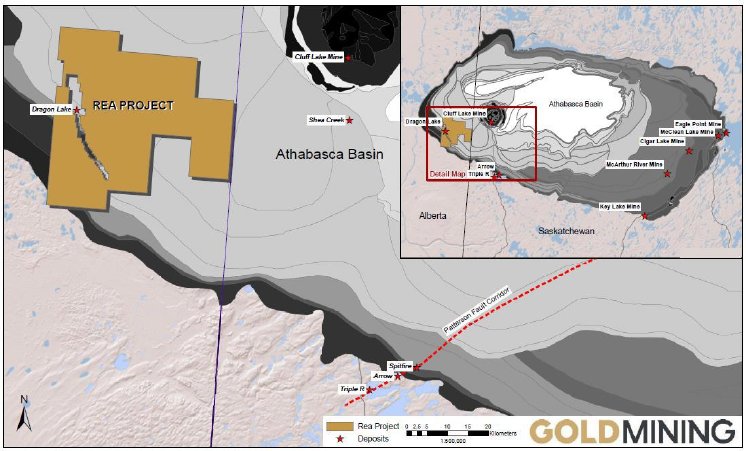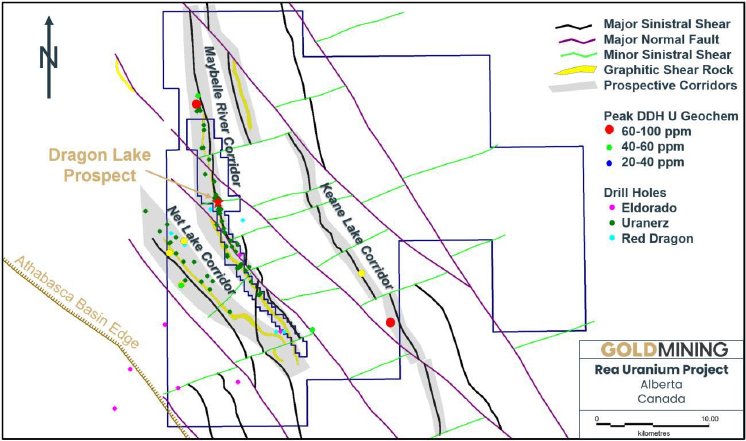Alastair Still, CEO, stated: "The cost-efficient work by our technical team to advance our highly prospective Rea Project is consistent with our strategy of seeking to unlock further value for our shareholders. Our team has applied modern reprocessing techniques, including inversion modelling of the historic geophysical surveys. This work has highlighted the most prospective areas for follow-up exploration, outlined over 70 km within three distinct corridors, each with several target areas displaying geophysical signatures consistent with known Athabasca Basin uranium deposits. We are extremely encouraged by the targets we have generated within the Athabasca Basin, an area that contains some of the world’s largest and highest-grade uranium deposits. This work enhances our activities that have and continue to focus on unlocking value within our portfolio of gold and gold-copper projects located throughout the Americas."
Rea Project Highlights:
• Reprocessing, inversion modelling and reinterpretation of historic geophysical surveys have identified over 70 linear kilometres of basement conductive trends on the Rea Project, interpreted as graphite-bearing shear zones which are prospective for unconformity-style uranium mineralization in the Athabasca Basin, in three northwest trending corridors (see Figure 2):
o The Maybelle River Corridor (11 km) trending northward from Orano's Maybelle River Project, which hosts shallow high-grade uranium mineralization at the Dragon Lake prospect.
▪ Five historic drill holes tested a portion of the Maybelle River Corridor on the Company’s Rea Project claims, intersecting anomalous uranium values in two holes, and anomalous pathfinder elements and pathfinder minerals including clay alteration and dravite, which is a distinctive accessory mineral associated with many major Athabasca uranium occurrences, in three of the five drill holes.
o The Net Lake Corridor (20 km) has seen only wide spaced drilling (comprising 20 historic holes), with five holes intersecting anomalous uranium values and associated pathfinder elements and minerals.
o The Keane Lake Corridor (40 km) is largely untested except for two historic drill holes that intersected anomalous uranium values in the south-central area of the Rea Project.
• Each of the three prospective corridors are interpreted as potentially significant and deeply rooted basement structures, which are known to be fundamental to the formation of Athabasca uranium deposits. Drill-proven fault and shear zones have been intersected on both the Maybelle River and Net Lake corridors.
• Follow-up exploration programs are expected to include additional geophysics to refine targets in advance of drilling.
Geophysical Processing, Inversion and Modeling
Unconformity-related uranium deposits in the Athabasca Basin are commonly associated with conductive graphite-bearing shear zones. These zones are located in basement rocks below the basin sedimentary formations and can be detected and mapped via electrical geophysical methods. The shear zones are typically overlain by broad hydrothermal alteration zones in the overlying sandstone. Uranium mineralization is commonly hosted in the sandstone at or near the unconformity, however, there are several deposits such as Fission's Triple R and NexGen's Arrow that are hosted within graphitic shear zones in the basement rocks.
GoldMining recently commissioned Fathom Geophysics LLC to process, invert and model historic airborne and ground geophysical surveys that included: Versatile Time Domain Electromagnetics (EM) and magnetic surveys flown in 2005; an Induced Polarization (IP) survey completed in 2006; and a Full Tensor Gradiometry survey flown in 2009. The results of this work were used to manually produce a structural and lithological interpretation consistent with the modelled geophysics and tectonic setting of the Rea Project area (Figure 2).
The Net Lake Corridor (20 km) has been tested by 20 widely spaced drill holes with five of these holes intersecting anomalous uranium and associated pathfinder elements such as vanadium, nickel, cobalt and arsenic, and pathfinder minerals such clay alteration and dravite.
The Maybelle River Corridor (40 km total length, 11 km on Rea Project claims) hosts Orano's Maybelle River project, which includes shallow (<200 m deep) high-grade uranium mineralization at the Dragon Lake prospect. Dragon Lake, discovered in 1988, has previously reported historic high-grade drill intersections including 17.7% U3O8 over 5 m in MR-39 and 4.7% U3O8 over 1.7 m in MR-34.1 The Maybelle River Corridor extends northwards for 11 km onto the Company’s 75% owned Rea Project claims, where five historic holes have tested only 3 km of the northern extension of the prospective corridor to date. The drilling intersected encouraging anomalous uranium values in two of the holes, as well as clay alteration, breccias and anomalous pathfinder elements in three of the holes.
The Keane Lake Corridor (40 km) is largely unexplored, except for two historic drill holes that intersected anomalous uranium values in the south-central area of the Project.
Please see the technical report titled "Technical Report on the Rea Property, Northeastern Alberta, Canada", dated effective September 12, 2014, for details on the Rea Project and historic results referenced herein.
1 Wheatley, K. and Cutts, C., 2013: Overview of the Dragon Lake Uranium Prospect, Maybelle River Area, Northeastern Alberta, Exploration and Mining Geology, Vol. 21, p 51-62, Canadian Institute of Mining, Metallurgy and Petroleum.
Qualified Person
Tim Smith, P. Geo., Vice President Exploration of GoldMining, has supervised the preparation of and approved the scientific and technical information contained herein. Mr. Smith is a qualified person defined in National Instrument 43-101 Standards of Disclosure for Mineral Projects ("NI 43-101").
About the Rea Uranium Project
The Rea Project consists of 16 contiguous exploration permits covering approximately 125,328 hectares surrounding Oranoꞌs Maybelle River project, which hosts the relatively shallow, Dragon Lake prospect. The Rea Project is located approximately 175 km north-northwest of Fort McMurray, Alberta, which is serviced daily by commercial flights from Edmonton and Calgary. Access to the Project is by winter roads connecting Fort McKay and Fort Chipewyan, or by air charter.
About GoldMining Inc.
The Company is a public mineral exploration company focused on the acquisition and development of gold assets in the Americas. Through its disciplined acquisition strategy, the Company now controls a diversified portfolio of resource-stage gold and gold-copper projects in Canada, U.S.A., Brazil, Colombia, and Peru. The Company also owns more than 21.5 million shares of Gold Royalty Corp. (NYSE American: GROY), 9.9 million shares of U.S. GoldMining Inc. (Nasdaq: USGO), and 26.7 million shares of NevGold Corp. (TSXV: NAU). See www.goldmining.com for additional information.
For additional information, please contact:
GoldMining Inc.
Amir Adnani, Co-Chairman, David Garofalo, Co-Chairman
Alastair Still, CEO
Telephone: (855) 630-1001
Email: info@goldmining.com
In Europe:
Swiss Resource Capital AG
Jochen Staiger & Marc Ollinger
info@resource-capital.ch
www.resource-capital.ch
Notice to Readers
Technical disclosure in this news release regarding the Rea Project has been prepared by the Company in accordance with NI 43-101. NI 43-101 is a rule of the Canadian Securities Administrators applicable to the disclosure of scientific and technical information concerning mineral projects. These standards differ from the requirements of the U.S. Securities and Exchange Commission (“SEC”) and the scientific and technical information contained in this news release may not be comparable to similar information disclosed by domestic United States companies subject to the SEC's reporting and disclosure requirements.
Cautionary Statement on Forward-looking Statements
Certain of the information contained in this news release constitutes “forward-looking information” and “forward-looking statements” within the meaning of applicable Canadian and U.S. securities laws (“forward-looking statements”), which involve known and unknown risks, uncertainties and other factors that may cause the Company’s actual results, performance and achievements to be materially different from the results, performance or achievements expressed or implied therein. Forward-looking statements, which are all statements other than statements of historical fact, include, but are not limited to, expected future work at the Rea Project, the Company plans and expectations regarding the Rea Project and statements regarding the Company's strategy to unlock value for shareholders. Forward-looking statements are based on the then-current expectations, beliefs, assumptions, estimates and forecasts about the business and the markets in which GoldMining operates. Investors are cautioned that all forward-looking statements involve risks and uncertainties, including: the inherent risks involved in the exploration and development of mineral properties, fluctuating metal prices, unanticipated costs and expenses, risks related to government and environmental regulation, social, permitting and licensing matters, any inability to commence and complete work as expected, the Company’s plans with respect to the Rea Project may change as a result of further planning or otherwise, and uncertainties relating to the availability and costs of financing needed in the future. These risks, as well as others, including those set forth in GoldMiningꞌs Annual Information Form for the year ended November 30, 2023, and other filings with Canadian securities regulators and the SEC, could cause actual results and events to vary significantly. Accordingly, readers should not place undue reliance on forward-looking statements. There can be no assurance that forward-looking statements, or the material factors or assumptions used to develop such forward-looking statements, will prove to be accurate. The Company does not undertake to update any forward-looking statements, except in accordance with applicable securities law.



